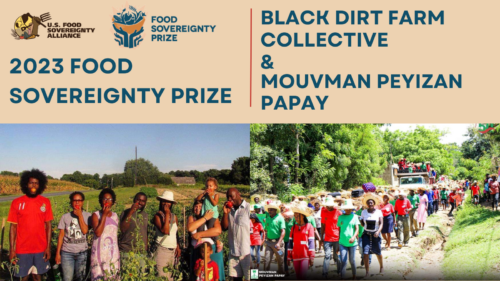Today is World Food Day!
Congratulations to Black Dirt Farm Collective and kompliman to the Haiti’s Mouvman Peyizan Papay (MPP) for winning the 2023 Food Sovereignty Prize!

“When we received word of this honor during our Food Sovereignty Camp, 450 young peasant leaders let out a thunderous cry of joy,” said MPP leader Jusléne Tyresias. “Through MPP’s 50-year history, Haiti’s peasants have persisted, not only confronting multiple crises head-on, but planting seeds – literally and figuratively – for our people to live with dignity, safety, and sovereignty.”
See and share the press release and learn more about the Prize here
What’s up with the Farm Bill?
With gratitude to Maggie and the Sustainable Agriculture and Food Systems Funders for the update!
Unfortunately (and unsurprisingly), Congress blew clear past the September 30th farm bill reauthorization deadline. Many of the largest farm bill programs have funding through the end of 2023, but there are several other key programs facing a three-month funding pause at least. These include programs like the National Organic Certification Cost-Share, which helps offset costs for farmers transitioning to organic practices. USDA’s Farm Service Agency will also not be able to authorize new contracts in the Conservation Reserve Program, which pays farmers to remove environmentally sensitive land from agricultural production.
Download the free Eater’s Guide to the Farm Bill for the PC(USA) platform, worship resources, and more.
Other programs could see significant ramifications. The Environmental Quality Incentives Program (EQIP), for example, is funded through 2031 thanks to major boosts from the Inflation Reduction Act (IRA). However, USDA is unnecessarily suggesting an EQIP payment limit of $450,000 per farmer is lapsing with the expiration of the 2018 Farm Bill. According to Politico, USDA is still evaluating whether it will honor that limitation without new legislation. This is a major red flag. Failing to enforce an already high payment limit (joint operations, including CAFOs, can receive up to $900,000) could mean more EQIP funding for expensive and environmentally suspect projects that benefit industrial CAFOs, such as methane digesters, which cost millions of dollars. NRCS itself noted in a 2020 final rule, “Without a contract limit, joint operations could receive very large payments under an EQIP contract.”
Congress must now pass a new farm bill by December 31, or extend the 2018 Farm Bill. The Republican desire to redirect IRA funds away from farm bill conservation programs into other commodity support programs remains a key sticking point. And the House is still stalled as the race for a new Speaker continues after Rep. Steve Scalise dropped out.
The work of the Presbyterian Hunger Program is possible thanks to your gifts to
One Great Hour of Sharing.